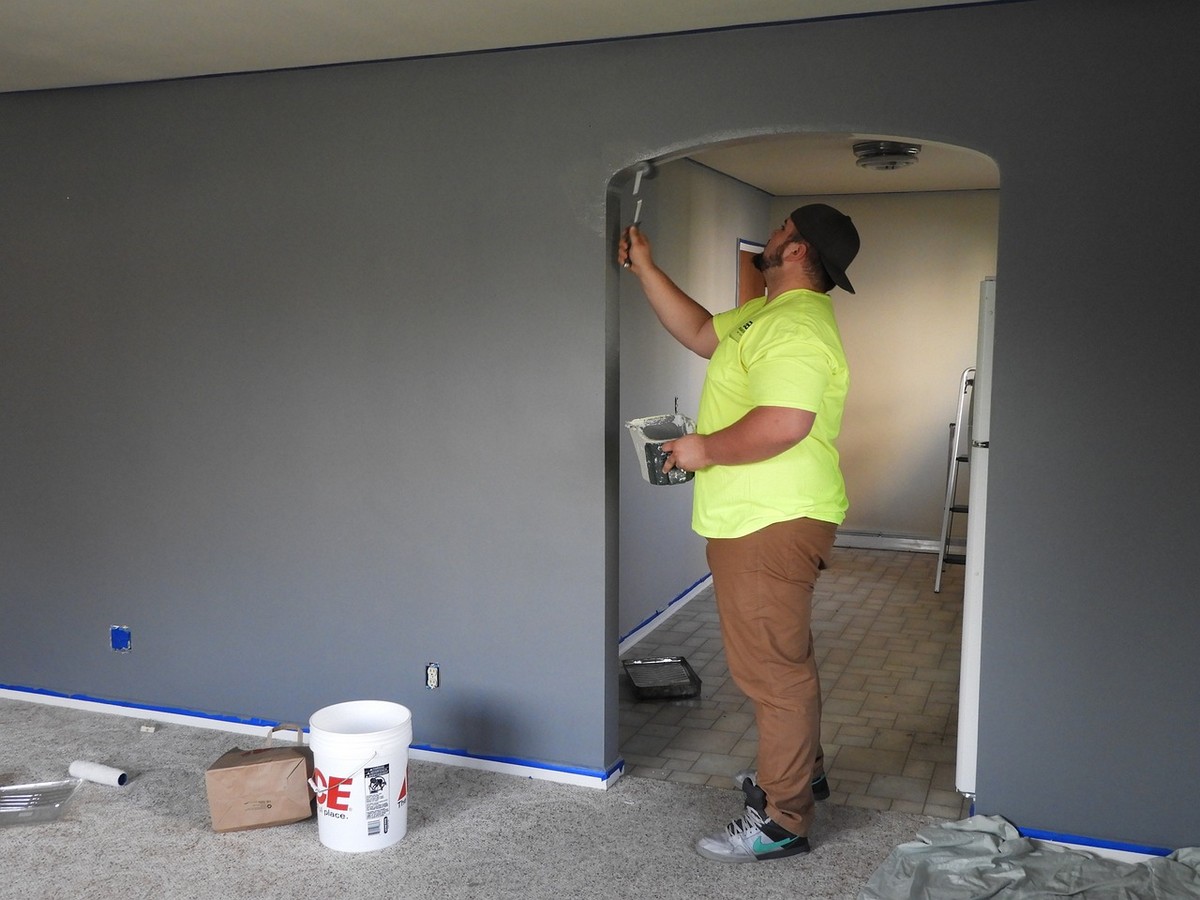What happens if you don’t get HOA approval for home renovations guide, Property design advice, House renewal style
What happens if you don’t get HOA approval for home renovations tips
post updated 17 February 2024
You’ve just finished renovating your home. It’s perfect, or so you thought.
Suddenly, you realize you’ve forgotten one crucial detail: HOA approval. Oops!
Now, you’re asking, ‘What happens if I don’t get HOA approval for home renovations?’
Don’t fret. We’re here to explore that exact situation, guide you through the HOA approval process, and help you avoid future blunders.
Buckle up! It’s time to dive into the complex world of homeowner associations.
28 September 2023
Understanding HOA community
You’re living in a HOA community, but do you know what that means?
It’s crucial to understand your role as a homeowner in the HOA and why the rules and approvals matter.
Not getting the green light from your HOA for home renovations could lead to some serious issues, so let’s discuss why.
What is a homeowners association community and HOA board?
In a HOA community, you’re living under the governance of an organization that sets rules for properties and their residents. These homeowner associations, governed by an HOA board, can control everything from your home’s exterior color to the kind of pets you can have. Why not source a good Site Plan for HOA?
Here’s a glimpse into what these associations are about:
Community Association:
• It cultivates a sense of neighborhood and community.
• It helps maintain property values by enforcing rules.
HOA Board:
• Board members are elected from the community to manage and enforce the rules.
• They oversee community finances and maintenance.
Don’t underestimate the power of the HOA community. They’re more than just a neighborhood watch; they’re the governing body of your local neighborhood, ensuring it remains a pleasant and cohesive place to live.
The Role of Homeowners in a HOA
Participating actively in your HOA isn’t just about following rules; it’s about shaping your community’s future. You’re not merely a homeowner; you’re a vital element. You can influence the HOA’s rules and regulations, making your community a better place.
Getting HOA approval for changes to your home isn’t a hurdle but a safeguard to maintain the community’s standards. It’s essential to remember that the HOA’s rules aren’t arbitrary; they’re there for a reason.
As homeowners in an HOA, you’ve got a voice and a vote. Use them both wisely. Don’t just abide by the rules; understand them and contribute to them. After all, a homeowners association isn’t just a set of rules; it’s a community, your community.
Importance of HOA Rules and Approvals
While understanding and adhering to HOA rules might seem tedious, it’s crucial for maintaining harmony and value in your community. This is especially true when you’re planning home renovations, as you’ll need approval from the homeowners association to proceed. You can find the set of rules for your community in a document called CC&Rs (Declaration of Covenants, Conditions, and Restrictions).
Importance of HOA rules:
• Maintaining Aesthetics: Homeowners Association rules ensure your home and the entire community maintain a uniform and appealing look.
• Avoiding Conflict: Strict adherence to the rules can prevent disputes among neighbors.
If you violate these rules, perhaps by undertaking renovations without approval, you might face penalties. It’s not only about getting approval for home renovations but also about respecting the collective decisions of your community.
Risks of Not Obtaining a Homeowner Associations Approval
If you’re thinking about skipping HOA permit/approval for your home renovations, you might want to reconsider.
Without this approval, you’re risking hefty penalties, potential legal action, and a negative impact on your property’s value.
It could even complicate future real estate transactions.
What Happens If You Renovate Your House Without HOA Approval?
Surprisingly, you’ll find that renovating your house without HOA permit can lead to serious consequences. It’s not just about rule-breaking; it’s about maintaining your community’s standards. The HOA approval process is designed to ensure that all renovations meet the rules and regulations.
Why is homeowners association approval important?
• Ensures architectural harmony in the community.
• prevents the devaluation of properties due to unapproved renovations.
If you choose to renovate your house without HOA permit, they could take legal action. You might be slapped with a hefty fine for not getting HOA approval, or worse, be legally compelled to undo your renovations.
Penalties for disregarding HOA approvals
Ignoring homeowners association approvals can land you in hot water, facing hefty fines and, in some cases, legal action for non-compliance. Let’s say you’ve made some home renovations without approval; penalties for disregarding HOA approvals can be severe. The HOA could impose a hefty fine, which you’d have to pay. If you don’t comply, don’t be surprised if they take legal action against you.
Impact on Property Value and Real Estate Transactions
You’re risking a significant decrease in your property value and potential difficulties in future real estate transactions if you don’t secure that crucial approval from the hoa for your home renovations. Not only could your property values drop, but it might also become a nightmare when you’re trying to sell your home.
Here’s why:
• Real estate agents will have a harder time selling your home due to:
• Potential legal issues with the HOA
• A decrease in prospective buyers who won’t risk purchasing a home without HOA approval for renovations
• Your home’s value could be negatively affected due to:
• The cost of restoring the property to its original state
• The perception of your home as risky leads to lower offers.
Don’t gamble with your investment. Always get HOA approval before starting renovations.
Possibility of Legal Action from the HOA Board
If you bypass getting approval for home renovations, you’re potentially opening yourself up to legal action from the HOA board. Say you decide to add a deck but the HOA doesn’t approve. You’re not only violating the rules, but you’re also inviting the possibility of legal action from the HOA board. They’ve got the power to declare your renovations unenforceable.
That means you could be ordered to undo all the work you’ve done. On top of that, you could be fined for each day the violation remains. It’s a costly error that can easily be avoided. So before you jump into any home renovations, remember to get the green light from your HOA.
Dealing with Post-Renovation Rule Violations
When you’ve completed a renovation without HOA approval, you might find yourself facing post-renovation rule violations. It’s not the end of the world, though, and there are steps you can take to remedy the situation.
Let’s discuss how to obtain retroactive HOA approval, how to mend damaged relationships within your HOA community, and tips for resolving disputes with your HOA board.
How to Get Retroactive HOA Approval
You’ll need to know how to secure retroactive HOA approval if you’ve already made some changes without it. This is crucial because your homeowners association might require you to undo your renovation without their consent. To get approval:
• Approach your HOA board. Explain your situation and ask for retroactive HOA approval.
• Show them any relevant documents, like your renovation plans or permits.
• Be patient and willing to compromise.
If the board refuses, consider seeking legal advice. Remember, a lawyer can guide you but can’t guarantee approval.
Don’t let this scare you. Instead, let it motivate you to always secure HOA approval before starting any renovations. It’s easier to get permission than forgiveness.
Addressing damaged relationships within the HOA community
In your situation, it’s essential to repair those strained relationships within the HOA community after a renovation dispute, as they’ll have a significant impact on the community’s harmony.
Don’t forget, the HOA may have rules, and you didn’t seek approval first. It’s easy to feel cornered, but your neighbors are likely just enforcing the HOA’s rules to maintain a pleasant environment.
Open a dialogue with your neighbors, express your regret for not following the protocol, and assure everyone that you’ll comply with the HOA rules in the future.
This process of addressing damaged relationships within the HOA community isn’t just about pacifying your neighbors. It’s about rebuilding trust and fostering a healthy community where everyone feels respected and heard.
Tips for Resolving Disputes with the HOA Board
To navigate through the process of resolving disputes with your HOA board, it’s crucial for you to understand the rules and regulations, as well as to approach the board with an open mind.
Here are some tips for resolving disputes:
• Communication is key.
• First, try having a conversation with your HOA board about the issue.
• Ensure you’re clear about your intentions and listen to their concerns too.
• Seek HOA approval for home renovations.
• If the dispute is about home renovations, make sure you have the HOA’s approval first.
• This can help avoid unnecessary disputes with the HOA board.
Avoiding renovating your house without HOA approval
You’re thinking about renovating your home, but are you worried about potential HOA rule violations?
It’s crucial to understand when you need HOA approval for renovations and plan smartly.
If this sounds like too much hassle, you might want to consider moving to a house without an HOA.
Planning Smart: Home Renovation Projects That Rarely Require HOA Approval
In planning your next home renovation, consider projects that rarely require HOA approval and save yourself the time and hassle of going through the approval process. Planning smart: home renovation projects that rarely require HOA approval can include minor landscaping, interior painting, and small repairs. These types of home renovations usually don’t raise eyebrows with the HOA, letting you spruce up your space with less red tape.
Always remember, though, that each HOA is different. What doesn’t require HOA approval in one community might in another. So, it’s best to always check your specific HOA’s rules before starting any renovation.
Planning smart and knowing which projects rarely require HOA approval can make your home renovations a breeze. As you weigh these considerations, it may also be time to think about when to consider moving to a house without an HOA.
Common FAQs about HOA Rules and Approvals
You’ve got questions about HOA rules and approvals, and we’re here to answer them.
Ever wondered what could happen if you painted your house without HOA approval or if you didn’t know you needed approval for a change?
Let’s tackle these queries and more, including the legal binding of HOA rules and whether exterior changes can be done without approval.
What Happens If You Paint Your House Without HOA Approval?
Don’t be surprised when the consequence of painting your house without HOA approval becomes a hefty fine. You see, the need for approval isn’t just a formality. It’s a binding agreement between you and your community. If you decide to paint your house without HOA approval, you’re directly going against that agreement.
Here’s what happens if you paint without approval:
• You’re likely to receive a warning.
• If you ignore the warning, further action will be taken.
• You might be asked to undo the paint job.
• This means additional costs on your behalf.
Are Homeowner Associations rules legally binding?
You’re probably wondering whether HOA rules are legally binding, and the answer is yes, they typically are. When you live in a community that requires an HOA, you’re agreeing to abide by their rules. HOAs have rules for everything, from your home’s exterior paint color to major renovations. It’s not just a friendly suggestion; they can legally enforce these rules and demand your compliance.
If you don’t get HOA approval before making changes, you could face penalties. These may range from fines to being forced to redo the work you’ve done. So, are HOA rules legally binding? Absolutely.
Now, what if you didn’t know you needed approval? Let’s delve into that next.
What If I Didn’t Know I Needed Approval?
If you didn’t know you needed approval for a home renovation, you’d find yourself in a tricky situation, but there are several steps you can take to rectify the issue.
It’s crucial to understand that many HOAs require approval for home renovations. This is to maintain a cohesive aesthetic and property values within the community. If you’ve started renovations without HOA approval, don’t panic.
• First, stop all work immediately. This might prevent further complications.
• Second, approach your HOA board. Explain that you didn’t know approval was necessary.
• Request retroactive approval for the changes.
Can Siding or Other Exterior Changes Be Done Without Approval?
The short answer is no. It’s required to have approval from your HOA for major exterior changes, including siding and home renovations.
But don’t stress! Working with HOAs can be straightforward. They’re there to maintain a cohesive look in your neighborhood.
If you’re thinking about making changes, it’s best to check with them first. Submit your plans and wait for approval before starting any work. Ignoring this step can lead to penalties or, worse, having to undo your hard work.
Conclusion: The Right Way to get HOA Approval
There are three key steps you’ve got to remember when dealing with HOA approval correctly.
Step 1: Understand the governing documents. These are your HOA’s bylaws and regulations (cc&r). They outline what types of home renovations require HOA approval. Not familiarizing yourself with these can lead to serious consequences.
Step 2: Consult with your property manager and conduct an architectural review. The property manager knows the ins and outs of your HOA’s rules. They’ll guide you through the approval process. On the other hand, your architectural review committee can give you feedback on your renovation plans.
Step 3: Submit your plans for approval. Don’t start any work until you’ve received written permission from your HOA.
Remember, complying with the HOA approval process is crucial for your home renovations. You don’t want to end up having to undo any work or pay hefty penalties. Always keep open communication with your property manager and the architectural review committee. They’re there to help you navigate the process.
Stick to these steps, and you’ll avoid the pitfalls of not getting your renovations approved by your HOA. And if you decide that you’d rather not deal with HOA compliance, you can always use moving cost tools to start planning an escape to a new neighborhood.
Comments on this guide to What happens if you don’t get HOA approval for home renovations article are welcome.
Home Renovation
Home Renovation Posts
Making Your Home Renovation Hassle Free
Before Taking on a Home Renovation Project
Teaching your family how to save energy

Buildings
Residential Architecture Articles
Comments / photos for the What happens if you don’t get HOA approval for home renovations tips page welcome.







